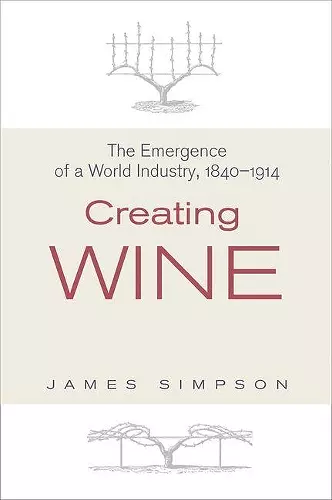Creating Wine
The Emergence of a World Industry, 1840-1914
Format:Hardback
Publisher:Princeton University Press
Published:28th Oct '11
Currently unavailable, and unfortunately no date known when it will be back

Today's wine industry is characterized by regional differences not only in the wines themselves but also in the business models by which these wines are produced, marketed, and distributed. In Old World countries such as France, Spain, and Italy, small family vineyards and cooperative wineries abound. In New World regions like the United States and Australia, the industry is dominated by a handful of very large producers. This is the first book to trace the economic and historical forces that gave rise to very distinctive regional approaches to creating wine. James Simpson shows how the wine industry was transformed in the decades leading up to the First World War. Population growth, rising wages, and the railways all contributed to soaring European consumption even as many vineyards were decimated by the vine disease phylloxera. At the same time, new technologies led to a major shift in production away from Europe's traditional winemaking regions. Small family producers in Europe developed institutions such as regional appellations and cooperatives to protect their commercial interests as large integrated companies built new markets in America and elsewhere. Simpson examines how Old and New World producers employed diverging strategies to adapt to the changing global wine industry. Creating Wine includes chapters on Europe's cheap commodity wine industry; the markets for sherry, port, claret, and champagne; and the new wine industries in California, Australia, and Argentina.
Winner of the 2012 OIV Award in History, International Organisation of Vine and Wine "[T]his book ... has a decidedly, and fittingly, scholarly tone... There are some fascinating historical facts, including the widespread nature of fraud in the wine business."--Lettie Teague, Wall Street Journal "Anyone interested in the economic history of wine and drink should read this book."--Tyler Cowen, Marginal Revolution "[T]here can be no doubt that wine buffs whose interest in what they drink stretches rather further than the supermarket price and the colour of the stuff in the bottle (why read the label?) will find this book fascinating."--Books4Spain.com "In writing Creating Wine, James Simpson has done a great service to those who are interested in how a traditional industry inherited the modern, highly regulated, market structure we observe in places like France today. The book is important and carefully written. Anyone interested in wine or the interaction between markets and modern democratic states should buy it."--EH.Net Reviews "Given Simpson's excellent job in describing the evolution of the industry, this book should find a large audience."--Choice "This is a wonderful book for vine professionals, for wine professionals and for students of economic history alike, including for casual students."--Jacques Delacroix, Enterprise & Society "[This] is the first book to trace the economic and historical forces that gave rise to very distinctive regional approaches to creating wine."--World Book Industry "Creating Wine was a delight to read. Simpson has chosen to study a pivotal time in wine production, dictated not only by changing market structure but also various supply shocks and societal factors. While many of us may have some idea of the broad issues that existed in the market for wine around this time, Simpson has provided a thoroughly researched, comprehensive piece of work that will satisfy anyone from novice to expert."--Tim Davis, Australian Journal of Agricultural and Resource "Creating Wine represents, perhaps, the single greatest achievement in advancing our understanding of the globalizing wine trade during its most formative decades (1840-1914)."--Kevin Goldberg, European History Quarterly
ISBN: 9780691136035
Dimensions: unknown
Weight: 595g
360 pages